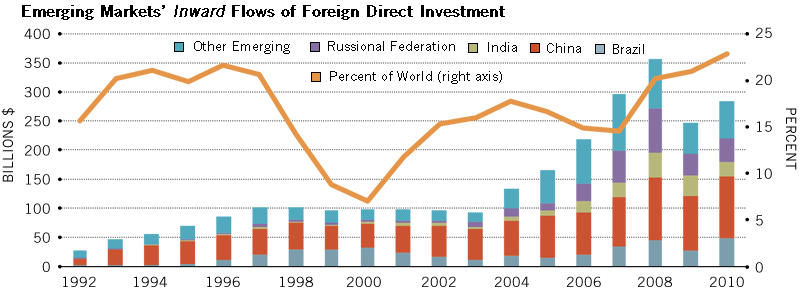Investing in Emerging Markets
Post on: 29 Сентябрь, 2015 No Comment

Shanghai Skyline Source: sxc.hu Photo: henryy
Now that things are looking a little better for the economy, and now that investors are showing a little more appetite for risk, you might be hearing more about emerging markets. Emerging markets are those countries that are developing economically, and preparing to become major players on the worlds economic stage. The two most well-known emerging markets are China and India. With Brazil and Russia, they make up the BRIC nations, considered the leaders of the up-and-comers in the global economy. However, there are other emerging market economies, such as those in Mexico, South Africa and countries in Southeast Asia, South America, Eastern Europe and the Middle East. For those who have a little more risk tolerance. emerging markets can make intriguing and profitable investment options.
Characteristics of emerging markets
Emerging markets present interesting sets of challenges, based largely on the characteristics that they seem to share. Some of the characteristics of many emerging markets include:
- Rapid growth. This is perhaps one of the main reasons that some investors are so interested in emerging markets. Their economies are growing rapidly. Even Chinas slowed GDP growth was close to 8% for quarter two of 2009. The rapid economic growth presents investment opportunities.
- Producers. Nearly all of the emerging market economies are producer economies. They create products that other countries buy. Often, people in emerging market economies produce more than they buy, which is part of the reason economic growth is so explosive during the good times. Rich, developed nations buy what is produced, tipping the flow of money in favor of producer nations.
- A degree of political instability. Even in emerging market countries where the politics are reasonably stable, there are still issues. Some of the countries have government that are at odds with U.S. foreign policy. Also, in many emerging markets, politics and events have a much larger and immediate influence on the economy than in more developed countries.
- Fragmentation. Often, there is a relatively high degree of fragmentation in emerging market economies. In some cases, it is necessary to deal with a local economy instead of trying to take advantage of an entire country as though it is a single monolithic market.
- Volatility. Emerging markets are volatile. The situation can change quickly, due to any number of factors that may or may not seem related to the economy. While it is possible to make large gains in a short amount of time, it is also equally likely that you could lose a great deal of money.
Investing in emerging markets
It is important to be careful when investing in emerging markets. Commodities and currencies are rather risky, but offer the highest chance of returns. You can also invest in individual stocks in some emerging markets. Understand that when investing in any foreign country, you are taking an additional risk of the currency exchange rates fluctuating. Make sure you understand the laws and regulations surrounding these actions. Accounting in other countries may not closely follow GAAP so it is important to understand the differences. US tax law also treats income derived from foreign investments differently depending on whether the country has a tax treaty with US or not. Also, consult with a knowledgeable tax professional about those kinds of implications. When considering emerging markets, it is also good to remember that bonds may not be much less risky than stocks. U.S. Treasury bonds are backed by the most stable tax-payer base in the world. Emerging markets cant make that claim.
Investing directly in an emerging market stock listed on that countrys exchanges can be difficult and not many discount brokers can execute such orders. It can be done through some of the full service brokers but can become very expensive. Several companies from emerging markets have listed their stock on US exchanges in the form of an ADR (American Depository Receipts) or ADS (American Depository Shares). As a requirement for this listing, these companies issue US GAAP equivalent of their financial statements (in addition to their traditional statements). Investing in these companies may be easier in terms of transparency and transactional ease.
Most people, however, prefer to limit their risks by investing in emerging markets funds. There are stock indexes that follow emerging market investments. There are also ETFs that include stocks, commodities, bonds and/or currencies from emerging markets. These types of investments can help reduce your risk (returns might be smaller as well), while still giving you access to the opportunities afforded by emerging market investments. When investing in these funds, you should read the prospectus carefully as some of these funds try to hedge out the risk of currency fluctuations, while some others are totally vulnerable to them.
While emerging market investments can add some growth and diversity to your portfolio, it is important to be careful when including them in your asset allocation. William Bernstein (author of The Four Pillars of Investing ) recommends in Money Magazine that you limit your emerging market holds to between 5% and 10% of your holdings. And thats high end. Carefully and honestly evaluate your risk tolerance before risking even that much of your portfolio in emerging market investments that could result in large losses.














